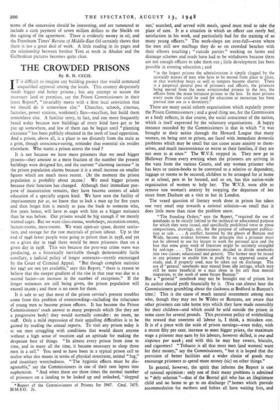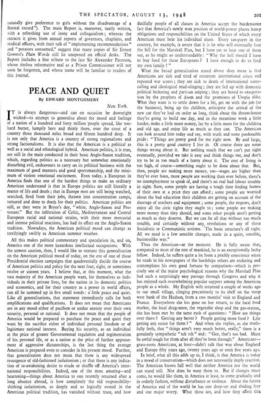THE CROWDED PRISONS
By R. H. CECIL
T is difficult to imagine any building project that would command I unqualified approval among the locals. This country desperately needs bigger and better prisons ; but any attempt to secure the necessary land or premises, say the Prison Commissioners in their latest Report*, "invariably meets with a firm local conviction that we should do it somewhere else." Churches, schools, cinemas, factories, power stations, workmen's flats—excellent, but build them somewhere else. A familiar story, in fact, and one more frequently heard today because new buildings of every kind have got to be put up somewhere, and few of them can be begun until "planning clearance" has been publicly obtained in the teeth of local opposition. And a prison, above all, is a place to see distantly from the train as a grim, though conscience-easing, reminder that essential sin resides elsewhere. Who wants a prison across the road ?
It is not because we have more prisoners that we need bigger prisons—they amount to a mere fraction of the number the present buildings were designed for, and the current "alarming increase" in the prison population alarms because it is a small increase on smaller figures which are much more recent. (At the moment the prison population is probably about 20,000.) We need bigger prisons because their function has changed. Although their immediate pur- pose of incarceration remains, they have become centres of adult education of a specially urgent kind. We have seen the futility of imprisonment j:47 se, we know that to lock a man up for five years and then forget him is merely to pass the buck to someone who, five years hence, will have to cope with him as a bigger nuisance than he was before. Our prisons would be big enough if we merely wanted cages. But we want class-rooms, workshops, recreation-rooms, lecture-rooms, mess-rooms. We want open-air space, decent sanita- tion, and storage for the raw materials of prison labour. Up to the end of 1946 fewer people were going to prison than in 5938, and yet on a given day in 1946 there would be more prisoners than on a given day in 1938. This was because the post-war crime wave was producing, as a historically inevitable though demonstrably futile corollary, a judicial policy of longer sentences—sternly encouraged by the Court of Criminal Appeal. "But though complete statistics for 1947 are not yet available," says this Report, "there is reason to believe that the steeper gradient of the rise in that year was due to a second factor—an increase in the number of receptions." If the longer sentences are still being given, the prison population will exceed 20,000 ; and there is no room for them.
It is safe to say that most of the prison service's present troubles come from this problem of overcrowding—including the reluctance of young men to become prison officers. It has become the Prison Commissioners' stock answer to many proposals which (for they are a progressive body) they would normally consider: no room, no staff. Only a mild impression of their appalling difficulties is to be gained by reading the annual reports. To visit any prison today is to see men struggling with conditions that would daunt anyone without a high sense of vocation and an aptitude for making the desperate best of things. "In almost every prison from time to time, and in many all the time, it became necessary to sleep three men in a cell." You need to have been in a typical prison cell to realise what this means in terms of physical constraint, animal "fug," and insanitary wretchedness. "The hygienic effects must be dis- agreeable," say the Commissioners in one of their rare lapses into euphemism. "And when there are three times the normal number of prisoners on a landing to be locked up and unlocked, 'slopped *Report of the Commissioners of Prisons for 1947. Cmd. 7475. 2s. out,' searched, and served with meals, speed must tend to take the place of care. It is a situation in which an officer can rarely feel, satisfaction in his work, and particularly bad for the training of so many young officers." , The work-shops are over-full—eVen where the men still sew mailbags they do so on crowded benches with their elbows touching ; "outside parties" working on farms and drainage schemes and roads have had to be withdrawn because there are not enough officers to take them out ; little development bas been possible in evening education ; and "in the largest prisons the administration is simply clogged by the unwieldy masses of men who have to be moved from place to place, so that workshop hours as well as tempers become shorter. There is a perpetual general post of prisoners and officers, the prisoners being moved from the more overcrowded prisons to the less, the officers from the more fortunate prisons to the less. In most prisons every room that could be used for education or recreation has been pressed into use as a dormitory."
There are many social reform organisations which regularly pester the Prison Commissioners ; and a good thing too, for the Commission as a body reflects, in due course, the social conscience of the nation,
which is itself expressed by the voluntary organisations. A happy instance recorded by the Commissioners is that in which "it was brought to their notice through the Howard League that many women, on being sent to prison, are faced with immediate domestic problems which may be small but can cause acute anxiety to them-
selves, and much inconvenience or worse to their families, if they are not seen to at once." The W.V.S. stepped in. They now go to Holloway Prison every evening when the prisoners are .arriting in the vans from the various Courts, and any woman prisoner who
has keys 'or ration-books to be conveyed to a relative or dependent,
luggage or rooms to be secured, children to be arranged for at home or at school, pets to be housed, and so on, has .this nation-wide organisation of women to help her. The W.V.S. were able to
remove one woman's anxiety by stopping the departure of her sister from Durham pn a visit to her in London.
The vexed question of literary work done in prison has taken one very small step towards a rational solution—so small that it does little more than raise the problem anew.
"The Standing Orders," says the Report, "required the use of notebooks to be strictly limited to the technical or educational purpose for which they were issued, and specifically prohibited verse or prose compositions, drawings, etc., for the purpose of subsequent publica- tion or sale. . . . A conflict, haunted by the ghosts of Bunyan and Wilde, became evident between the principle that a prisoner must not be allowed to use his leisure to work for personal gain and the fear that some great work of literature might be untimely strangled by red-tape... . . The Commissioners decided to divide notebooks into two classes, educational and general. The former may be issued to any prisoner to enable him to profit by an approved course of study, and, if properly used, may be taken out on discharge. The
use of 'general' notebooks may extend from idle jottings which may
still be more beneficial to a man alone in his cell jottings, mental stagnation, to the work of some future Bunyan."
But a "general" notebook may not be brought out of prison lest its author should profit financially by it. (You can almost hear the Commissioners grumbling about the slackness at Bedford in Bunyan's time.) This is the cause of much natural resentment among men who, though they may not be Wildes or Bunyans, are aware that other prisoners can take home toys which they have made ostensibly for. their children—and which could be sold outside the prison in some cases for several pounds. This persistent policy of withholding the reward that sweetens all labour is, I think, a mistaken one. It is of a piece with the scale of prison earnings—even taday, with a recent fifty per cent, increase to meet bigger prices, the maximum wage a prisoner may e;Lrn by his labours, however skilled, is one and sixpence per week.; -and with this he may buy sweets, biscuits, and cigarettes! "Tobacco is all that most men (and women) want for their money," say the Commissioners, "but it is hoped that the provision of better facilities and a wider choice of goods may encourage prisoners to spend more money (sic) on other things."
In general, however, the spirit that informs the Report is one of rational optimism: only one of their many problems is admitted to " defy solution "—that of the Borstal girl who has an illegitimate child and no home to go to on discharge ("homes which provide accommodation for mothers and babies all have waiting lists, and
naturally give - preference to girls without the disadvantage of a Borstal record "). The main Report is, moreover, tautly written, with a refreshing use of irony and colloquialism ; whereas the extracts it gives from annual reports of governors, chaplains, and medical officers, with their talk of "implementing recommendations" and "potatoes consumed," suggest that many copies of Sir Ernest Gowers's Plain Words still lie unopened on official desks. The Report includes a fine tribute to the late Sir Alexander Paterson, whose tireless reformative zeal as a Prison Commissioner will not soon be forgotten, and whose name will be familiar to readers of this journal



































 Previous page
Previous page